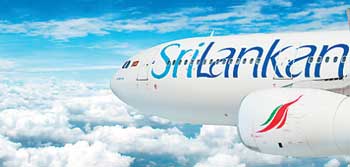Sunday Feb 22, 2026
Sunday Feb 22, 2026
Tuesday, 23 January 2018 01:02 - - {{hitsCtrl.values.hits}}
 SriLankan Airlines, the National Carrier of Sri Lanka and a member of the oneworld alliance, yesterday said it had achieved the highest-ever monthly revenue in the company’s history in December 2017.
SriLankan Airlines, the National Carrier of Sri Lanka and a member of the oneworld alliance, yesterday said it had achieved the highest-ever monthly revenue in the company’s history in December 2017.
The air-transport operation of the company recorded a stand-alone revenue of $ 100.1 million, the first instance in the 38-year history of the airline where monthly operating revenue reached this landmark figure.
The airline attributes the increase in revenue to its expanded network and continuous improvement in revenue management processes.
A total of 566,627 passengers were carried during the month, a 27% increase over December 2016 and recorded a Passenger Load Factor of 85.9% - above that of most major airlines in the world. Cargo carriage too witnessed a significant growth, rising 23% year-over-year to 12,016 metric tons.
The airline’s newly-launched route to Melbourne, Australia, was a resounding success – achieving a Passenger Load Factor of 92.4% and recording a significant overall profit during the month. This makes Melbourne the first long-haul route launch of the airline in recent years to reach profitability in such a short period.
The airline also recorded a successful month in terms of operational efficiency, recording an average aircraft utilisation of 13.8 hours per day. The wide-bodied fleet of Airbus A330 aircraft achieved an average daily utilisation of 15.2 hours – with industry leading reliability.
The airline’s strategy of re-fleeting with fuel-efficient “single aisle” aircraft paid off, with its five-strong fleet of Airbus A320neo family aircraft helping to combat rising fuel costs. Two days of un-forecast fog in the Gulf were the only blight on the month, leading to several delays due to aircraft diversions.
The company’s subsidiary and business units – including SriLankan Catering and Ground Handling – too recorded a stellar performance, comfortably exceeding their revenue and profitability in comparison to the prior year.
The Ground Handling division did particularly well, both financially and operationally, despite have to cope with record numbers of passengers, congested facilities at BIA and unusually high disruptions due to inclement weather.
The company recorded a net positive result for the month even after interest costs, with an un-audited net profit of $ 3 million.
However, the management stressed that this positive result is only a beginning, especially considering the fact that oil prices have increased by over 25% compared to December 2016.
The fuel cost which accounted for 25% of the total operating expenditure a year ago, has risen to 31% whilst the ticket price (yield) has barely increased due to fierce competition and persistent over capacity, ills which are affecting most airlines.
Accordingly, much hard work remains to be done in order to drive the airline into sustainable year-round profitability. The airline business is highly seasonal and even achieving a break-even performance during off-peak months require significant improvements, which can be only achieved through a major restructuring. In line with this goal, the airline is currently developing the next phase of its restructuring and operational overhaul strategy.
Assisting in this complex task is a reputed industry consultant working together with the Government-appointed Officials Committee.